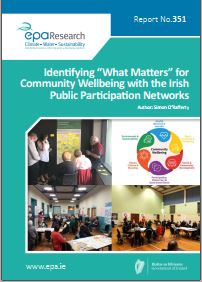Author: Simon O’Rafferty
Summary: The Public Participation Networks (PPNs) were established through the 2014 Local Government Reform Act in order to “provide a mechanism by which citizens can have a greater say in local government decisions which affect their own communities”. This report presents the findings from an action research project in which a toolkit to develop visions of community wellbeing was co-designed with four PPNs.

Socio-economics :: Environmental Protection Agency, Ireland
https://www.epa.ie/media/epa-2020/publications/research/Thumbnail_351.jpg